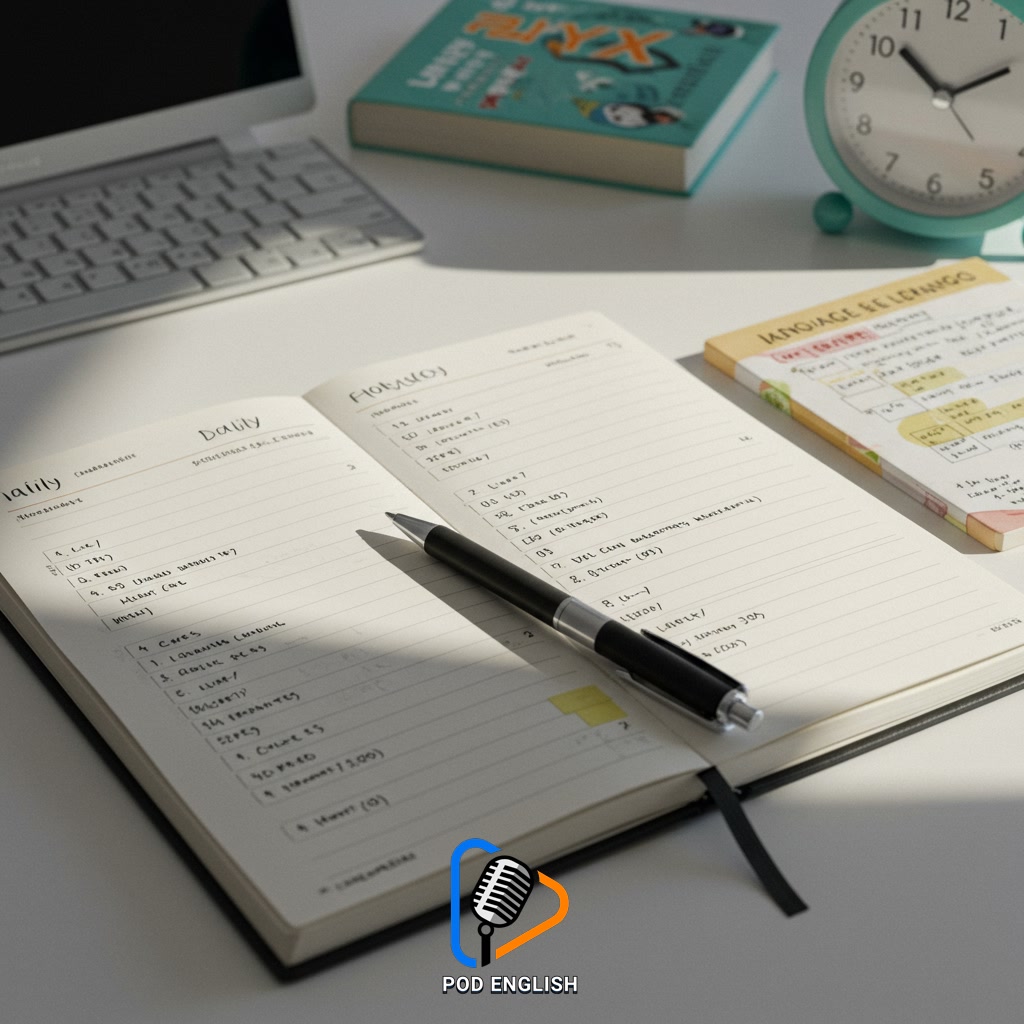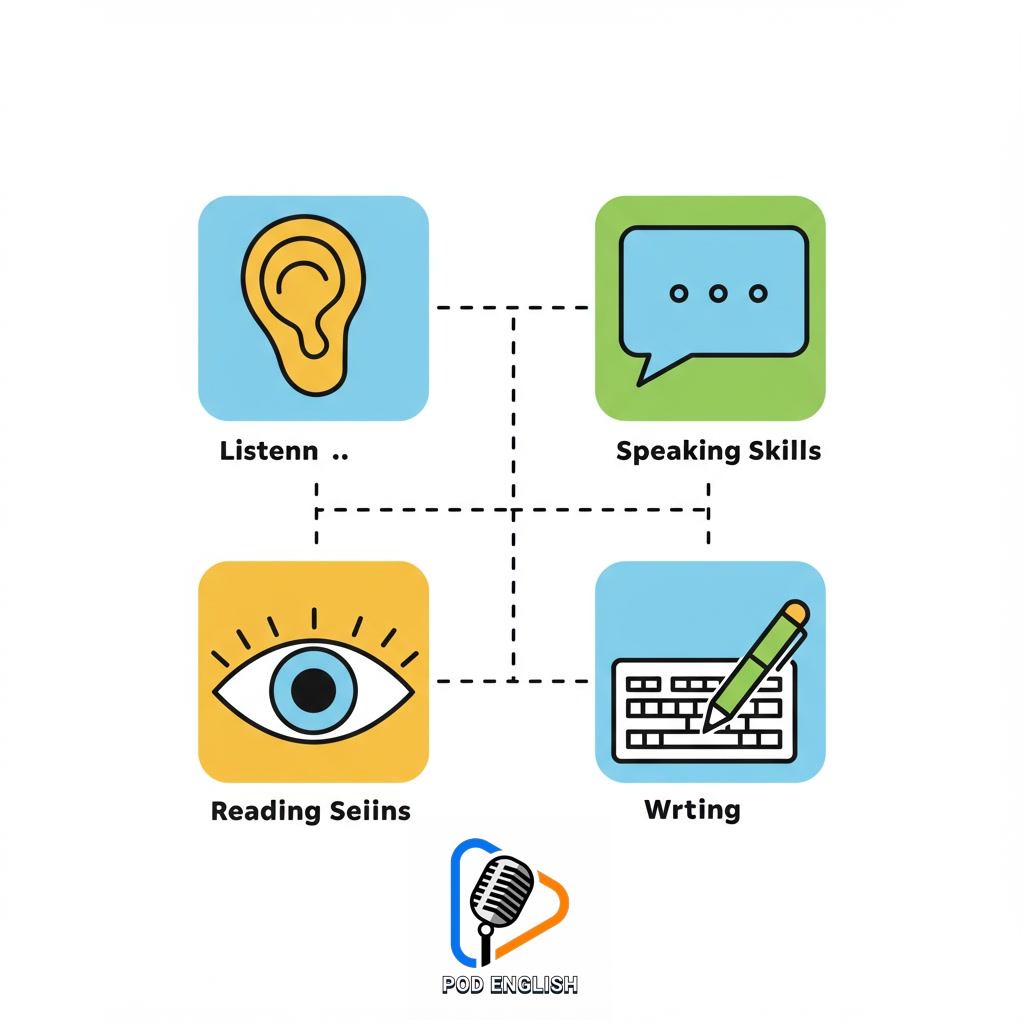Learn English
Unlock Your English Potential: Build Powerful Daily Routines for Effective Study

This content explores how to significantly improve your English language skills. It emphasizes the power of establishing consistent, effective daily routines for study english. By integrating practical habits into your day, you can unlock your full potential and make substantial progress in language acquisition.
Table of Contents
- Section 1: The Power of Routine: Why Daily Study Unlocks English Potential
- Section 2: Designing Your Personalized English Study Routine: Setting Goals and Identifying Needs
- Section 3: Building Blocks of an Effective Daily English Routine: Listening, Speaking, Reading, Writing
- Section 4: Incorporating Vocabulary and Grammar into Your Daily Study
- Section 5: Making Your Routine Stick: Strategies for Consistency and Motivation
- Section 6: Tracking Progress and Adapting Your Routine for Continuous Improvement
Section 1: The Power of Routine: Why Daily Study Unlocks English Potential
Consistency is the cornerstone of effective language learning. Establishing a daily routine, even if only for brief periods, creates a powerful cumulative effect that sporadic study cannot replicate. This regular engagement transforms the daunting task of learning English into a manageable habit. Each small session reinforces previous learning, keeps vocabulary and grammar fresh, and builds momentum. Over time, these consistent efforts compound significantly, leading to tangible progress and boosting confidence. Embracing the power of routine makes learning English a natural, integrated part of your day, truly unlocking your potential for fluency and mastery.

The Power of Routine: Why Daily Study Unlocks English Potential
Section 2: Designing Your Personalized English Study Routine: Setting Goals and Identifying Needs
Building upon the foundation of consistency, the next crucial step in unlocking your English potential is actively designing a routine that truly works for *you*. This begins with clearly defining your learning objectives. Ask yourself: What specific skills do you want to improve (speaking, listening, reading, writing)? What level do you aim to reach, and by when? Setting SMART goals (Specific, Measurable, Achievable, Relevant, Time-bound) provides direction. Simultaneously, honestly assess your current English level, your learning style (visual, auditory, kinesthetic), and your available time. Identifying your personal needs and preferences is key; it allows you to select appropriate resources and activities that align with your strengths and target your weaknesses, making your daily study sessions more effective and sustainable.

Designing Your Personalized English Study Routine: Setting Goals and Identifying Needs
Section 3: Building Blocks of an Effective Daily English Routine: Listening, Speaking, Reading, Writing
Having established the importance of consistency and defined your personal goals, the core of your effective daily English routine is built upon the four fundamental language skills: Listening, Speaking, Reading, and Writing. Each of these components is crucial for holistic language development and should be integrated deliberately into your study English schedule. Listening enhances comprehension and pronunciation, speaking improves fluency and confidence, reading expands vocabulary and understanding of structure, and writing solidifies grammar and allows for creative expression. A well-rounded routine ensures dedicated time and practice for each skill, recognizing that they are interconnected and reinforce one another, leading to significant progress in unlocking your English potential.

Building Blocks of an Effective Daily English Routine: Listening, Speaking, Reading, Writing
Section 4: Incorporating Vocabulary and Grammar into Your Daily Study
Beyond practicing the four skills, a robust daily English routine must actively incorporate focused study of vocabulary and grammar. Instead of viewing these as separate, daunting tasks, integrate them seamlessly. Dedicate specific, short blocks of time each day – perhaps 10-15 minutes for each – to review new words from your listening or reading practice, or to tackle a specific grammar point that you found challenging during speaking or writing. Use flashcards, language learning apps, or simply a dedicated notebook to record and revisit new vocabulary in context. For grammar, work through exercises, analyze sentence structures in texts you read, or try writing sentences applying specific rules. Consistency is key; even small, daily efforts will build a strong foundation over time, making your overall language skills more accurate and expressive.

Incorporating Vocabulary and Grammar into Your Daily Study
Section 5: Making Your Routine Stick: Strategies for Consistency and Motivation
Maintaining a consistent English study routine can be challenging, even after integrating core skills, vocabulary, and grammar. The key to making your routine stick lies in strategy and self-awareness. Start by setting realistic, achievable goals that align with your current schedule and energy levels. Don’t aim for perfection; aim for progress. Track your study sessions, perhaps using a simple journal or app, to visualize your consistency and celebrate small wins. Find an accountability partner or join a study group to share your progress and challenges. Vary your activities within the routine to keep things fresh and prevent boredom. Recognize that setbacks are normal and don’t let a missed day derail your entire routine. By actively implementing these strategies, you build momentum and reinforce the habit of daily English study, transforming it from a chore into an embedded part of your life.

Making Your Routine Stick: Strategies for Consistency and Motivation
Section 6: Tracking Progress and Adapting Your Routine for Continuous Improvement
Following the emphasis on strategy and self-awareness for maintaining your study habits, the next crucial step is actively monitoring your progress and being willing to adjust your approach. Tracking helps you see what parts of your routine are working well and where you might be facing difficulties. This could involve keeping a simple study journal, using an app to log hours, or just making notes about what you learned or struggled with each day. Regularly reviewing these records allows you to identify patterns. Are you spending enough time on speaking? Is your vocabulary retention improving? Based on these insights, don’t hesitate to adapt your routine. Maybe you need to allocate more time to listening practice, try a different vocabulary learning technique, or reschedule your study sessions to fit your energy levels better. This cycle of tracking and adapting is essential for continuous improvement and ensures your routine remains effective and sustainable as your skills develop.
Tracking Progress and Adapting Your Routine for Continuous Improvement













